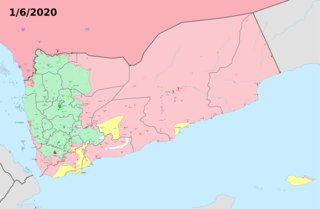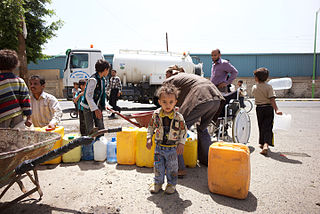In its war on terrorism in Yemen, the US government describes Yemen as "an important partner in the global war on terrorism". There have been attacks on civilian targets and tourists, and there was a cargo-plane bomb plot in 2010. Counter-terrorism operations have been conducted by the Yemeni police, the Yemeni military, and the United States Armed Forces.

Al-Qaeda in the Arabian Peninsula, or AQAP, also known as Ansar al-Sharia in Yemen, is a militant Islamist group primarily active in Yemen and Saudi Arabia that is part of the al-Qaeda network. It is considered the most active of al-Qaeda's branches that emerged after the weakening of central leadership. The U.S. government believes AQAP to be the most dangerous al-Qaeda branch. The group established an emirate during the 2011 Yemeni Revolution, which waned in power after foreign interventions in the subsequent Yemeni Civil War.

The Yemeni Civil War is an ongoing multi-sided civil war that began in late 2014 mainly between the Abdrabbuh Mansur Hadi-led Yemeni government and the Houthi armed movement, along with their supporters and allies. Both claim to constitute the official government of Yemen.

The Saudi Arabian-led intervention in Yemen is an intervention launched by Saudi Arabia on 26 March 2015, leading a coalition of nine countries from West Asia and North Africa, in response to calls from the pro-Saudi president of Yemen Abdrabbuh Mansur Hadi for military support after he was ousted by the Houthi movement due to economic and political grievances, and fled to Saudi Arabia.
International reactions to the Saudi-led intervention in Yemen of 2015 were mixed. Most other Arab League nations and several Western governments backed the Saudi Arabia-led military coalition, but other governments warned against an escalation in the violent situation in Yemen.

The Taiz campaign (2015–present) is a protracted military confrontation between opposing Yemeni forces in the city of Taiz for control of the city and surrounding area. The battle began one month after the start of the Yemeni Civil War.
The Bombing of Mokha took place on Friday night, 24 July 2015 between 9:30 and 10:00 p.m at Mokha city of Yemen. The airstrikes targeted two residential complexes belonging to engineers and technicians of al-Mukha power plant of Taiz province. According to the workers and residents of the compound one or more aircraft dropped nine bombs in separate sorties in intervals of few minutes.
A Saudi Arabian-led military intervention in Yemen began in 2015, in an attempt to influence the outcome of the Yemeni Civil War. Saudi Arabia, spearheading a coalition of nine Arab states, began carrying out airstrikes in neighbouring Yemen and imposing an aerial and naval blockade on 26 March 2015, heralding a military intervention code-named Operation Decisive Storm. More than 70 health facilities in Yemen have been destroyed by a series of airstrikes conducted by the Saudi Arabian-led coalition since March 2015. Many of these have been public health hospitals staffed or supported by Doctors Without Borders (MSF). Critics of the assaults say the airstrikes are war crimes in violation of the protections of health care facilities afforded by the internationally recognized rules of war and have called for independent investigations.

Almigdad Mojalli was a Yemeni freelance journalist working for the United States media service Voice of America. On 17 January 2016 Mojalli was killed by a Saudi airstrike in a village near Sana'a while attempting to report on the Saudi Arabian-led intervention in Yemen.
The Battle of Port Midi refers to a battle during the Yemeni Civil War between the Saudi coalition-backed Hadi loyalists and the Houthi government. Although Hadi loyalists seized the port, the Houthi fighters along with the popular committees managed to conduct some attacks around Midi. The conflict also had spillovers in the rest of the Hajjah Governorate. On 26 January 2017, Hadi loyalists extended their control to Harad District in Hajjah Governorate.
There have been many human rights violations committed by various groups after the Yemeni Civil War. There are two main groups involved in the ongoing conflict: forces loyal to the current Yemeni president, Abh Rabbuh Mansur Hadi, and Houthis and other forces supporting Ali Abdullah Saleh, the former Yemeni president. On 29 November 2017, fighting between forces loyal to Ali Abdullah Saleh and the Houthis began in Sana'a. al-Qaeda in the Arabian Peninsula and the Islamic State of Iraq and the Levant have also carried out attacks in Yemen. All sides of the conflict have been accused of human rights violations. Coalition forces led by Saudi Arabia and backed by the United States and other nations have also been accused of violating human rights and in some cases, breaking international law. The coalition forces intervened at Hadi's request, in an attempt to defeat the Houthis and restore Hadi's government. Coalition attacks, especially airstrikes, have been accused of causing large scale civilian deaths, but Saudi Arabia disputes these claims. The use of force by these groups has exacerbated the humanitarian crisis situation in Yemen, as critical infrastructure has been damaged or destroyed in attacks. In addition to the attacks, blockades of critical resources, such as fuel, to Yemen by Saudi Arabia have hindered the transport of food in Yemen, and the ability of civilians to travel to locations where there are adequate medical facilities. The situation in Yemen has been described as "one of the worst crises in the world" by the United Nations Humanitarian Coordinator for Yemen.
The following lists events that will happen in 2016 in Yemen.
Since 2016, a famine has been ongoing in Yemen which started during the Yemeni Civil War. More than 85,000 children have died as a result of the famine as of 2018. In May 2020, UNICEF described Yemen as "the largest humanitarian crisis in the world", and estimated that 80% of the population, over 24 million people, were in need of humanitarian assistance. The famine is being compounded by an outbreak of cholera, which is resulting in 5,000 new cases daily in June 2017. Devastation of Yemeni infrastructure, health, water and sanitation systems and facilities by Saudi-led coalition air strikes led to the spread of cholera. UNICEF says that there have been many attacks on water systems in Yemen cutting off water to many.
The following is a timeline of the Second Yemeni Civil War, which began in September 2014.

The blockade of Yemen refers to a sea, land and air blockade on Yemen which started with the positioning of Saudi Arabian warships in Yemeni waters in 2015 with the Saudi Arabian-led intervention in Yemen. The United States fired at Houthi rebels in the region in October 2016. In November 2017, after a Houthi missile heading towards King Khalid International Airport was intercepted, the Saudi-led military coalition stated it would close all sea land and air ports to Yemen, but shortly began reopening them after criticism from the United Nations (UN) and over 20 aid groups. The blockade of Yemen has resulted in widespread starvation, to the extent that the United Nations has raised concerns about the possibility of it becoming the deadliest famine in decades. The World Health Organization announced that the number of suspected persons with cholera in Yemen reached approximately 500,000 people.
Events in the year 2018 in Yemen.

On 22 April 2018, an airstrike by the Saudi Arabian-led coalition hit a wedding in the Bani Qa'is District of Hajjah Governorate, Yemen. Casualty estimates vary, with the Houthi-owned Al-Masirah reporting the toll later that day to be at least 33 civilians including the bride, while other estimates are higher. Forty-five other people were injured.

The Battle of Al Hudaydah, codenamed as Operation Golden Victory, was a major Saudi-led coalition assault on the port city of Al Hudaydah in Yemen. It was spearheaded by the United Arab Emirates and Saudi Arabia and has been considered as the largest battle since the start of Saudi Arabian-led intervention in Yemen in 2015.
On 9 August 2018, Saudi Arabian expeditionary aircraft bombed a civilian school bus passing through a crowded market in Dahyan, Saada Governorate, Yemen, near the border with Saudi Arabia. At least 40 children were killed, all under 15 years old and most under age 10. Sources disagree on the exact number of deaths, but they estimate that the air strike killed about 51 people.
During the Yemeni civil war, Saudi Arabia led an Arab coalition of nine nations from the Middle East and parts of Africa in response to calls from the internationally recognized pro-Saudi president of Yemen Abdrabbuh Mansur Hadi for military support after he was ousted by the Houthi movement due to economic and political grievances, and fled to Saudi Arabia.







